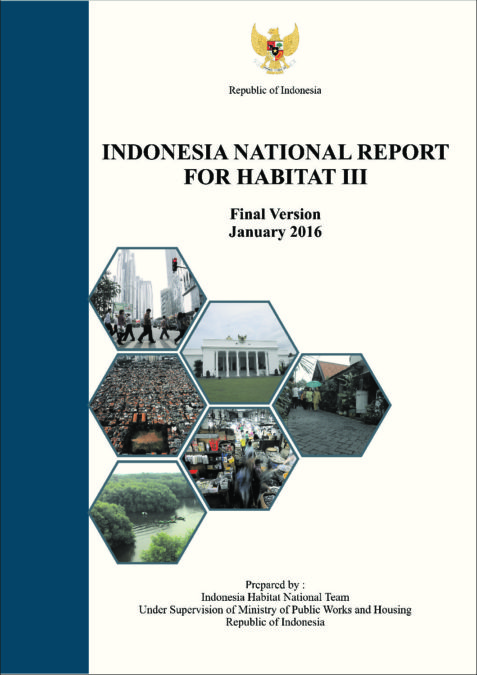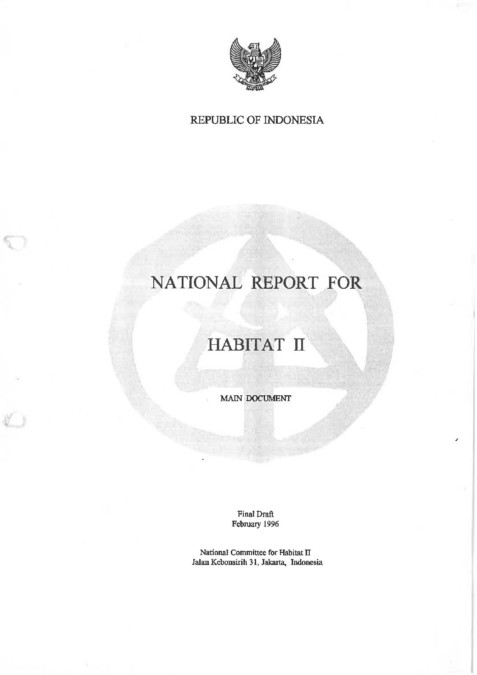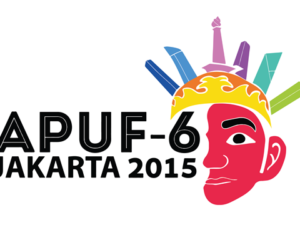
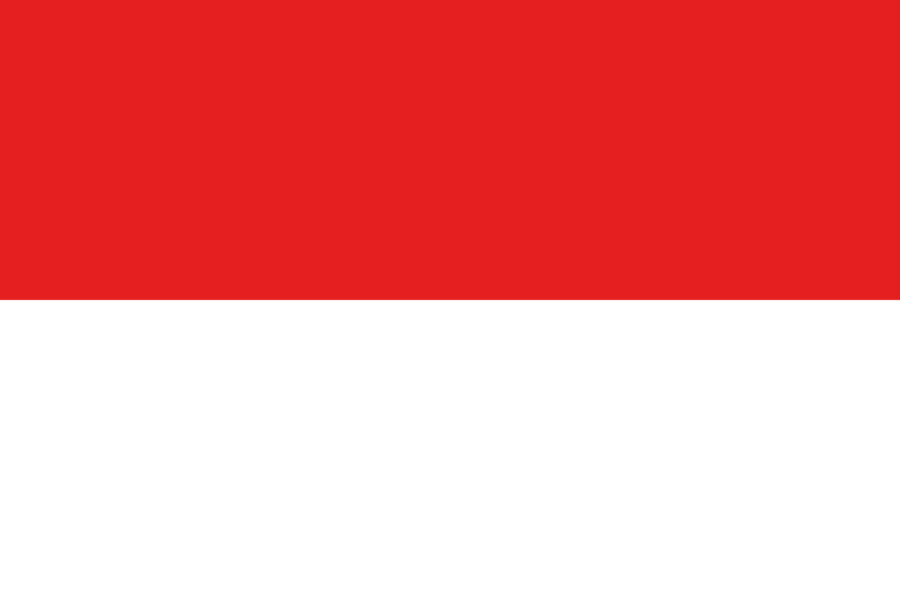
Indonesia
Urban indicators:
| Value | Year | ||
| Surface area (sq km) | 1910931 | 2014 | |
| Population (proj., 000) | 260581 | 2016 | |
| Pop. density (per sq km) | 143.8 | 2016 | |
| Capital city | Jakarta | 2015 | |
| Capital city pop. (000) | 10323 | 2015 | Refers to the functional urban area. |
| Population growth rate (average annual %) | 1.3 | 2010-2015 | |
| Urban population growth rate (average annual %) | 2.7 | 2010-2015 | |
| CO2 emission estimates (000 tons/tons per capita) | 479365/1.9 | 2013 | |
| Population using improved drinking water sources (urban/rural, %) | 94.2/79.5 | 2015 | |
| Population using improved sanitation facilities (urban/rural, %) | 72.3/47.5 | 2015 |
| 1995 | 2005 | 2014/2015 | |
| Urban population ('000) | 70,027 | 103,119 | 137,422 |
| Level of urbanization (%) | 36.1 | 45.9 | 53.7 |
| Proportion of urban population living in slum areas (%) | 42.6 | 26.3 | 21.8 |
| Urban Slum Population ('000) | 29,017 | 24,777 | 29,212 |
| Value | Year | |
| Urban Gini Coefficient | 0.33 | 1999c |
| Urban poverty headcount ratio based on national poverty lines | 8.3% | 2014 |
National Report:
National Report Executive Summary:
Approaching the conference on Habitat III in 2016, each UN country member has to prepare a national report reporting their achievement of the Habitat Agenda, which will then be used as inputs for formulating the next agenda of Habitat III. This national report consists of implementation of the Habitat Agenda, issues and challenges faced by each member country, and thoughts that contribute towards the future agenda.
UN Habitat provided the guideline and format for the writing of the national reports that comprise six topics, thirty issues and twelve indicators. The sixth topics are (1) Urban Demographic; (2) Land and Urban Planning, (3) Environment and Urbanization; (4) Urban Governance and Legislation; (5) Urban Economy, and (6) Housing and Basic Services. This national report would not reflect the commitment from the head of the Nation, as was presented as the documents from Habitat Agenda. This new format is seen as the elaboration and the reformulation of the commitment of Habitat Agenda, specifically on adequate shelter for all and sustainable human settlement. The shift from the field of housing and settlements towards sustainable urbanization is in line with the transformation at the world scale. The world has become more urbanized, and generates its own problems and challenges for the future existence of the human settlements. UN Habitat views that the concentration of human settlements for the next two decades is sustainable urbanization.
The process of writing Indonesia‘s National Report on the Implementation of the Habitat Agenda began early 2014. A national team was formed, led by the Ministry of Public Works. The team consisted of a steering committee, panel of experts and consolidating team to edit and finalize the report. In 2014, three workshops were held prior to the submission of the first draft of the National Report in September 2014. The workshops were held in three different cities to allow wider participation of local experts and stakeholders. The workshops were aimed to identify progress of the implementation of the Habitat Agenda, key issues and challenges for future urban development in the six themes.
A series of focused group discussions were held during 2015, involving the consolidation team (as major editors) and inviting prominent experts to gain inputs on the draft and finalize the report. The team decided to separate the issues on future challenges and new urban agenda from the 6 theme chapters, into separate chapters. These two chapters are most important as they will be inputs for the New Urban Agenda. In other side we have encountered challenges and problems in the process of writing National Report. One major problem in writing this report were lack of data as requested in the list of indicators. We recommend that the New Urban Agenda will be supported by clear indicators that can be adapted at the national and local level. Another problem is that urbanization is multi-sector and national policies and strategies on urban issues in Indonesia are by under different Ministries. This requires stronger efforts for coordination and compilation of the report.
Our special thanks to the following institutions for their continuous support during the process of writing the National Report: Ministry of Public Works and Housing, National Planning and Development Agency (Bappenas), Ministry of Foreign Affairs, Ministry of Home Affairs, Statistics Indonesia, The Urban and Regional Development Institute (URDI), Institut Teknologi Sepuluh November (ITS), Institut Teknologi Bandung (ITB), Universitas Indonesia, Universitas Diponegoro, Universitas Gadjah Mada (UGM), Universitas Nasional Sebelas Maret (UNS), Local Government of Surakarta, Local Government of Surabaya, Local Government of DI Yogyakarta, Indonesian Association of Planners (IAP), Indonesian Association of Architects (IAI), EAROPH Indonesia, Habitat Agenda Partners Indonesia (HAPI), Kemitraan Habitat Indonesia (Habitat Partnership), Habitat Indonesia National Secretariat and other individuals/institutions whose name we can‘t mention specifically.
Statistics:
Urban housing indicators
People living in slums (%)
Urban population with access to adequate housing (%)
Basic services and infrastructure
Urban population with access to safe drinking water (%)
Urban population with access to adequate sanitation (%)
Urban population with access to regular waste collection (%)
Level of effective decentralization
Policies and legislation on urban issues that local governments contributed to formulating since 1996 (%)
Share of both income and expenditure allocated to local governments from the national budget (%)
Statements by Indonesia:
-
Habitat III Plenaries
-
Intersessionals: Open-ended Informal Consultative Meetings
-
Intersessionals: Informal Intergovernmental Meetings (May 2016)
Statements by other countries on behalf of G77 and China:
-
Habitat III Plenaries
-
Intersessionals: Informal Intergovernmental Meetings (May 2016)
- Statement - 18 May (by Thailand) - English Made by Thailand on Behalf of G77 and China
- Statement - 18 May (by Jamaica) - English Made by Jamaica on Behalf of G77 and China
- Statement - 19 May (by Jamaica) - English Made by Jamaica on Behalf of G77 and China
- Statement - 19 May (by Kenya) - English Made by Kenya on Behalf of G77 and China
- Statement - 20 May (by Jamaica) - English Made by Jamaica on Behalf of G77 and China
- Statement - 20 May (by Thailand) - English Made by Thailand on Behalf of G77 and China
Events:
- Regional and High Level Process:

- More events:

A transformation and tools for delivery of water and sanitation services (Side Event PrepCom3)
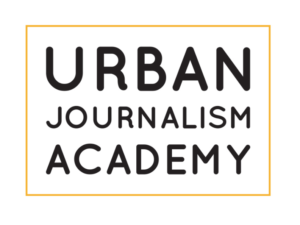
Southeast Asia On The Way To A New Urban Agenda

Urban Library (PrepCom3)
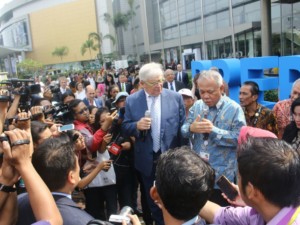
Preparatory Committee III (PrepCom3)

Seminar: Urban Heritage Tourism (Parallel Event PrepCom3)

Regional Meeting: Asia–Pacific

Asia Pacific Urban Forum (APUF VI)
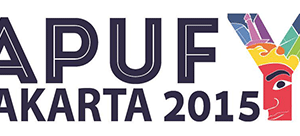
Urban Youth Assembly
We thank The Government of Indonesia for hosting the Habitat III Regional Meeting for Asia and the Pacific, and the Third Preparatory Committee Meeting, jointly with the City Government of Surabaya. We are very thankful for the active participation in the process and organization of all engagement activities, such as: Urban Breakfast, Urban Journalist Academy, and the National Urban Forum, which above all helped strategizing participation in the Habitat III process.

